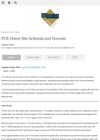Search
for
Sort by
Research
300-330 / 364 resultsresearch Medical Management of Female Pattern Hair Loss
research Diurnal Preference Predicts Phase Differences in Expression of Human Peripheral Circadian Clock Genes
An individual's morning or evening preference can predict changes in their body clock gene expression.
research Expanding the Phenotype: Four New Cases and Hope for Treatment in Bachmann-Bupp Syndrome
Four new cases of Bachmann-Bupp syndrome suggest potential for targeted treatment.

research Side Effects of Low-Dose Oral Minoxidil for Treating Alopecia
Low-dose oral minoxidil can be effective for hair loss but should be avoided in people with certain heart conditions and severe liver problems.

research Keloid Scars Arising After Follicular Unit Extraction Hair Transplantation
Keloid scars can form after hair transplant surgery and should be prevented and treated early.

research Five Cluster Classifications of Long COVID and Their Background Factors: A Cross-Sectional Study in Japan
The study identified five types of long COVID symptoms and suggests tailored management strategies for each.

research FUE Donor Site Ischemia and Necrosis
Heavy smoking and other factors may lead to reduced blood flow and tissue death after hair transplant surgery.

research Bachmann–Bupp Syndrome and Treatment
DFMO treatment improves hair growth, muscle tone, and development in Bachmann-Bupp syndrome patients.

research Co-Editors’ Messages
A man had hiccups for several days after a hair transplant, likely due to medication or nerve irritation, but they stopped on their own.
research Trichogenic Effect of Low Level Laser Therapy Combined with Platelet-Rich Plasma for the Management of Androgenetic Alopecia
Combining laser therapy with platelet-rich plasma improves hair growth in people with hair loss.
research Brain And Muscle Arnt-Like Protein-1 (BMAL1) Controls Circadian Cell Proliferation And Susceptibility To UVB-Induced DNA Damage In The Epidermis
BMAL1 controls skin cell growth and UV damage risk, peaking at night.

research Post-COVID-19 Syndrome: Persistent Symptoms at the Post-Viral Stage of the Disease. A Systematic Review of Current Data
Many patients experience long-lasting symptoms like fatigue and pain after COVID-19, regardless of initial disease severity.
research Methods in Hair Research: How to Objectively Distinguish Between Anagen and Catagen in Human Hair Follicle Organ Culture
A reliable system was developed to distinguish hair growth stages, aiding in identifying hair growth promoters or inhibitors.
research Characterization and Management of Hedgehog Pathway Inhibitor-Related Adverse Events in Patients With Advanced Basal Cell Carcinoma
Understanding and managing side effects of hedgehog pathway inhibitors can improve treatment for advanced basal cell carcinoma.
research Disturbance of the Circadian System in Shift Work and Its Health Impact
Shift work disrupts the body's natural clock, leading to health problems.
research A Meeting of Two Chronobiological Systems: Circadian Proteins Period1 and BMAL1 Modulate the Human Hair Cycle Clock
BMAL1 and Period1 genes can influence human hair growth.
research Selenium and Vitamin E Supplements for Prostate Cancer: Evidence or Embellishment?
Selenium and vitamin E supplements have mixed effects on prostate cancer risk and may not be beneficial for everyone.

research Trichodynia and Telogen Effluvium in COVID-19 Patients: Results of an International Expert Opinion Survey on Diagnosis and Management
COVID-19 patients often experience hair loss and scalp pain, which may be related to the severity of their infection and treatment drugs.
research Anticancer Agents Against Malaria: Time to Revisit?
Anticancer drugs like methotrexate and trimetrexate could be effective and safe for treating malaria at low doses.
research Pollen Allergies in Humans and Their Dogs, Cats, and Horses: Differences and Similarities
Humans and pets share similar allergy mechanisms, and studying pet allergies can help treat both human and animal allergies.

research Biochemical and Structural Characteristics, Gene Regulation, Physiological, Pathological and Clinical Features of Lipocalin-Type Prostaglandin D2 Synthase as a Multifunctional Lipocalin
Lipocalin-Type Prostaglandin D2 Synthase (L-PGDS) is a protein that plays many roles in the body, including sleep regulation, pain management, food intake, and protection against harmful substances. It also affects fat metabolism, glucose intolerance, cell maturation, and is involved in various diseases like diabetes, cancer, and arthritis. It can influence sex organ development and embryonic cell differentiation, and its levels can be used as a diagnostic marker for certain conditions.
research Tβ4-Overexpression Based on the PiggyBac Transposon System in Cashmere Goats Alters Hair Fiber Characteristics
Overexpressing Tβ4 in cashmere goats improves hair fiber traits and increases cashmere yield.
research Understanding Key Symptoms, Side Effects, and Impacts of HR+/HER2- Advanced Breast Cancer: Qualitative Study Findings
Patients with HR+/HER2- advanced breast cancer commonly experience fatigue, hair loss, and pain, which significantly affect daily activities.

research Gender Identity and Transition: Relationships With Sleep Disorders in US Youth
Transgender youth have more sleep disorders, but gender-affirming therapy may help reduce them.
research Pili Torti: A Feature of Numerous Congenital and Acquired Conditions
Pili torti is a rare condition where hair is twisted and breaks easily, often linked to genetic disorders or other health issues.
research Patient Experience in Systemic Lupus Erythematosus: Development of Novel Patient-Reported Symptom and Patient-Reported Impact Measures
New tools were created to help lupus patients report their symptoms and impacts more accurately.

research Estrogen Deprivation Effects of Endocrine Therapy in Breast Cancer Patients: Incidence, Management and Outcome
Managing side effects of endocrine therapy is crucial to improve adherence and survival in breast cancer patients.
research Soy Protein Containing Isoflavones Improves Facial Signs of Photoaging and Skin Hydration in Postmenopausal Women: Results of a Prospective Randomized Double-Blind Controlled Trial
Soy protein with isoflavones reduces wrinkles and improves skin hydration in postmenopausal women.

research Expert Recommendations on Supportive Skin Care for Non-Surgical and Surgical Procedures
Experts advise using sunscreen and proper skin care before, during, and after procedures to speed healing, prevent complications, and reduce scarring.